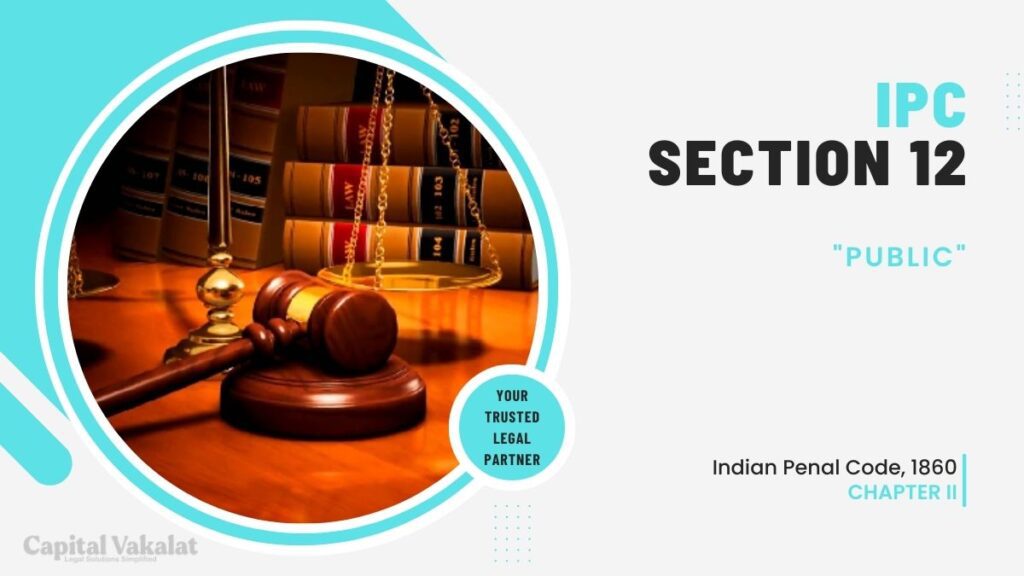In the realm of criminal law, the Indian Penal Code (IPC) serves as the cornerstone that defines and categorizes various offenses. Among its many sections, Section 12 holds significance as it pertains to the term “public.” This article delves into the intricacies of Section 12 of the IPC and sheds light on its interpretation, implications, and broader implications for the legal landscape.

The Indian Penal Code, enacted in 1860 during British colonial rule, stands as one of India’s most fundamental legal documents. Section 12 of the IPC lays the groundwork for understanding the term “public” in the context of criminal law. This provision plays a pivotal role in distinguishing offenses that affect a larger community from those that impact individuals in isolation.
Understanding Section 12 IPC
Section 12 IPC provides a general definition of the term “public.” It states that the term includes any class of the public or any portion thereof. This broad definition is intentionally comprehensive, encompassing a diverse range of scenarios and situations that affect a group of people collectively.
Interpretation of “Public”
The term “public” is not confined to a numerical threshold; instead, it hinges on the qualitative aspect of the impact. Courts have consistently interpreted “public” to mean a collection of individuals sharing common interests, rights, or concerns. This interpretation acknowledges that the term can refer to different group sizes, as long as the shared characteristic is substantial.
Key Aspects of Section 12
Section 12 considers both the quantitative and qualitative dimensions of the term “public.” It acknowledges that a group can be small but still qualify as “public” if the shared concern is vital. Conversely, a large group might not be considered “public” if the shared concern is trivial.
Applicability of Section 12
The applicability of Section 12 extends across various criminal offenses. It plays a crucial role in determining the severity of punishment, as crimes affecting the public at large are often treated with more stringent consequences. This provision ensures that the law addresses crimes with the potential to disrupt societal harmony and stability.
Evolving Perspectives
Over the years, societal values and norms have evolved, leading to a dynamic interpretation of Section 12. The concept of what constitutes the “public” has broadened to include digital communities and virtual spaces, reflecting the changing nature of interactions in the modern world.
Implications on Criminal Cases
Section 12 IPC has far-reaching implications on criminal cases. Crimes against a large or specific group of individuals fall under its purview, highlighting the societal impact of the offense. This has led to increased accountability for crimes that can disrupt peace and order on a broader scale.
Challenges and Criticisms
While Section 12 serves a crucial purpose, it’s not without its challenges. Critics argue that its broad definition could potentially be misused, leading to overreach by law enforcement agencies. Striking a balance between safeguarding public interests and protecting individual rights remains a challenge.
Balancing Public Interest
The crux of Section 12 lies in striking a balance between public interest and individual rights. Courts play a pivotal role in ensuring that the term “public” is not interpreted arbitrarily, preserving the spirit of justice and fairness.
Role of Judiciary
The judiciary’s role in interpreting and applying Section 12 is paramount. Precedents set by higher courts provide guidance to lower courts, ensuring a consistent and principled approach to cases involving the “public.”
Comparative Analysis
A comparative analysis of similar provisions in other jurisdictions reveals variations in the definition of “public.” This underscores the importance of contextualizing legal principles within the cultural, social, and political realities of a given society.
The Intersection with Freedom
Section 12 raises important questions about the boundaries of individual freedom. While the law seeks to protect the collective, it must do so without infringing upon personal liberties. This balance requires careful deliberation.
Impact on Society
The impact of Section 12 extends beyond the courtroom. It influences behavior, ethics, and awareness within society. By deterring crimes that affect the “public,” the section contributes to upholding social order.
Conclusion
In conclusion, Section 12 IPC is a pivotal provision that shapes the landscape of criminal law in India. Its interpretation and application play a crucial role in defining the scope of “public” and in ensuring that societal interests are safeguarded. Striking a balance between collective well-being and individual rights remains a delicate task, with the judiciary serving as the guardian of this equilibrium.
Certainly, here are some external resources for further details on IPC Section 12 and its implications:
- Indian Penal Code (IPC): Official source of the Indian Penal Code, including Section 12’s definition of “public.”
- Legal Services India – Section 12 IPC: In-depth analysis of Section 12 and its interpretation within the Indian legal context.
- LawRato – Understanding Section 12 IPC: Insights into the nuances of Section 12 and its relevance in criminal cases.
- Detailed commentary on Section 12 IPC, discussing its evolution and contemporary application.
These resources will provide you with a comprehensive understanding of IPC Section 12 and its implications in the legal landscape.
FAQs
How does Section 12 impact the severity of punishment for crimes?
Section 12 influences the severity of punishment by categorizing crimes that impact the public differently.
Can virtual communities be considered “public” under Section 12?
Yes, the definition of “public” has evolved to include virtual communities and digital spaces.
What challenges does Section 12 pose in its application?
Balancing public interest with individual rights and preventing potential misuse are challenges associated with Section 12.
How does Section 12 contribute to societal order?
Section 12 deters crimes that could disrupt societal harmony, contributing to maintaining social order.